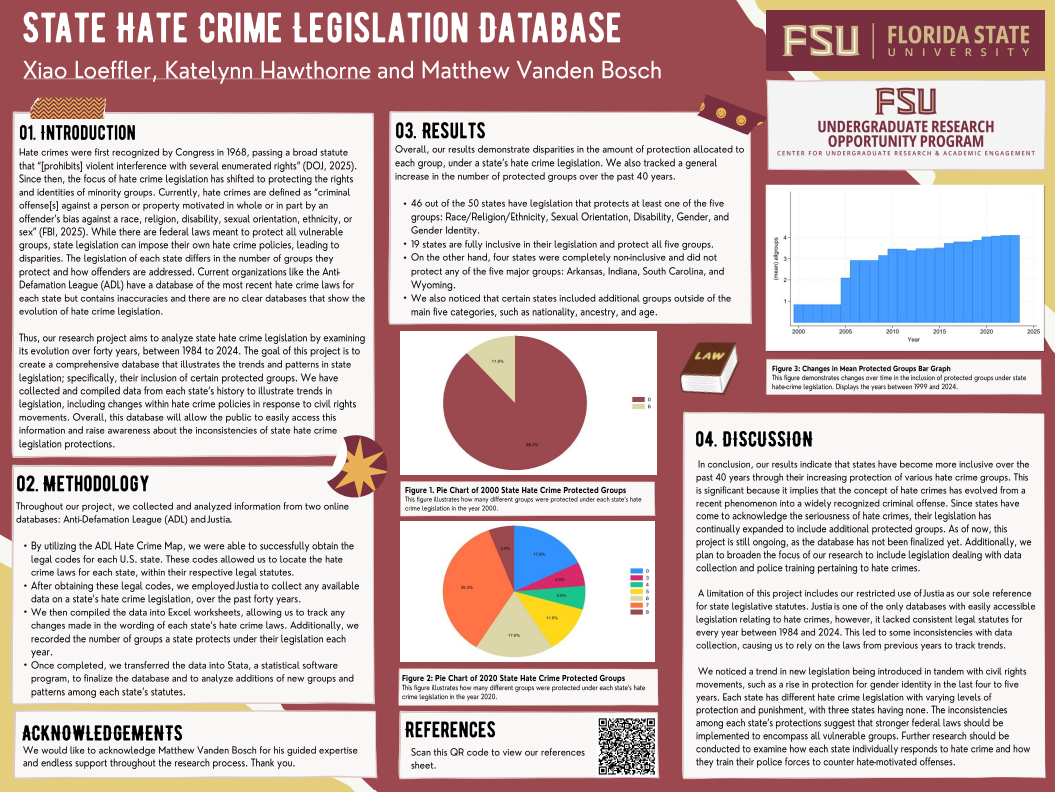Research Symposium
25th annual Undergraduate Research Symposium, April 1, 2025
Xiao Loeffler Poster Session 2: 10:45 am - 11:45 am/ Poster #231

BIO
Hi, my name is Xiao Loeffler and I am a first year at FSU. I plan on pursuing a dual degree in criminology and psychology, with goals of joining the FBI or a career in crime analysis. This research project is something I'm particularly passionate about, as I believe it's important for there to be adequate protection for all vulnerable groups and for more people to be fully aware of these rights. Hate crimes often go underreported and it can be difficult to acquire accurate data on the frequency of hate crimes due to its sensitive nature and the vagueness of many state laws. More research and resources should be allocated to studying hate crimes and improving legislation, ensuring that when a hate crime occurs the proper punishment and response takes place.
State Hate Crime Legislation Database
Authors: Xiao Loeffler, Matthew Vanden BoschStudent Major: Criminology and Psychology
Mentor: Matthew Vanden Bosch
Mentor's Department: Department of Criminology and Criminal Justice Mentor's College: College of Criminology and Criminal Justice Co-Presenters: Katelynn Hawthorne
Abstract
Hate crime legislation is a recent phenomenon in the United States, as the first state hate crime laws were passed in the 1980s. Since then, the federal government has also passed hate crime legislation, specifically addressing hate crimes based on race, gender, gender identity, sexual orientation, and disability. In an increasingly divided world, it’s important for states to establish this legislation to protect their communities. Thus, our research project analyzes the evolution of state hate crime legislation between the years 1984 to 2024. The goal of this project is to create a database that illustrates the trends and patterns in state legislation. This database was created utilizing information from two online databases: the Anti-Defamation League (ADL) and Justia. We compiled the hate crime laws and state statutes into Excel spreadsheets, allowing us to track changes made in the wording of state legislation. Once completed, we employed the program Stata to finalize the database and to analyze additions of new groups and patterns among each state’s statutes. Overall, our results demonstrate a disparity in protection among minorities across the United States. However, we tracked an increase in the number of protected groups within the past forty years, suggesting that state hate crime legislation has progressively become more inclusive. Lastly, inconsistencies among each state’s protections indicate that stronger federal laws should be implemented to encompass all vulnerable groups. Further research should be conducted to examine how states respond to hate crime and how they train their police forces to counter hate-motivated offenses.
Keywords: Hate crime, Legislation, Criminology

